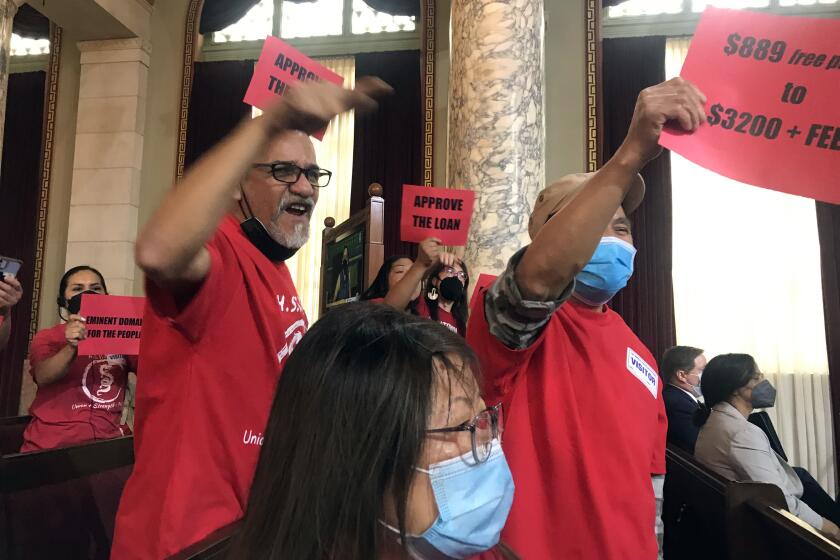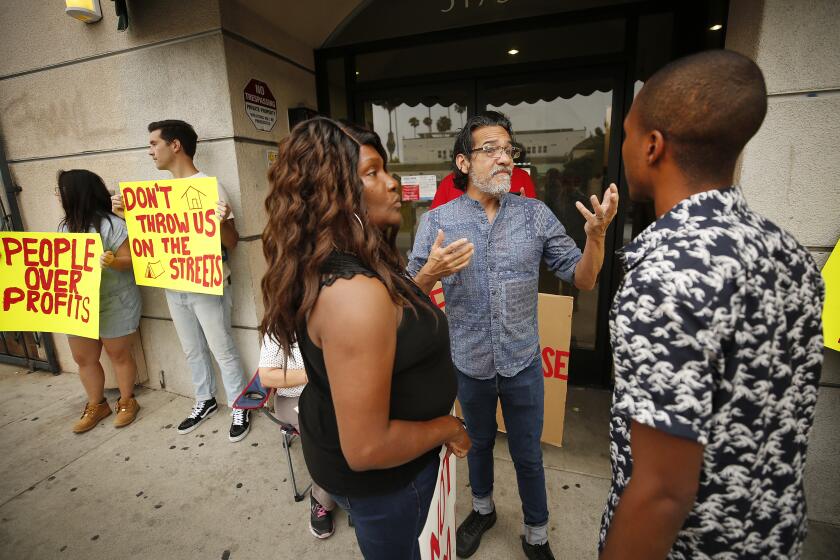Eminent domain was used to evict a Chinatown family. Now it might help them stay housed
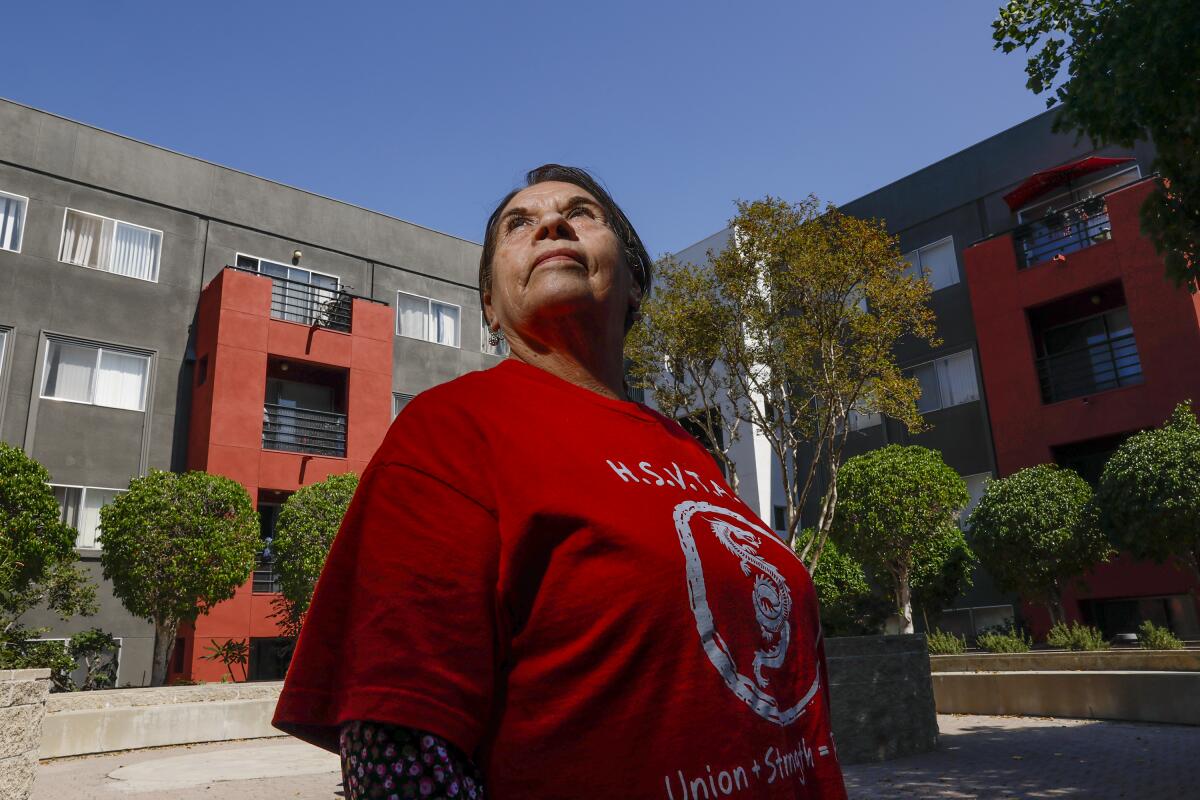
In 1988, eminent domain forced Rosario Hernandez and her family from their one-bedroom apartment east of downtown Los Angeles.
It’s a rarely used legal tool for cities to compel the sale of private property for a public use and has historically displaced poor, Black and immigrant communities. Back then, the “public use” was a 30-acre expansion of the Los Angeles Convention Center, and dozens of residential properties were condemned along with Hernandez’s.
Now, eminent domain could actually help keep Hernandez housed.
The Los Angeles City Council voted unanimously in 2021 to explore the use of eminent domain to acquire Hillside Villa, a 124-unit apartment complex in Chinatown where she has lived for 30 years with her husband, daughter and now grandson. Her apartment building’s affordability covenant kept rents low until it expired in 2018. Then came rent hikes and eviction notices.
Residents at Hillside Villa told the council they can’t afford the rents the landlord is seeking. “We’re going to be homeless,” one said, “and we need you to help.”
Now the city wants to buy Hillside Villa, an olive green and red painted four-story complex with a landscaped central courtyard and a small front yard shaded by mature trees — and keep it affordable. If the effort fails, Hernandez worries she’ll be separated from her family.
“If I lose this apartment, where will my daughter go? Where’s her baby going to go? What can we afford?” said Rosario, who’s on a fixed income.
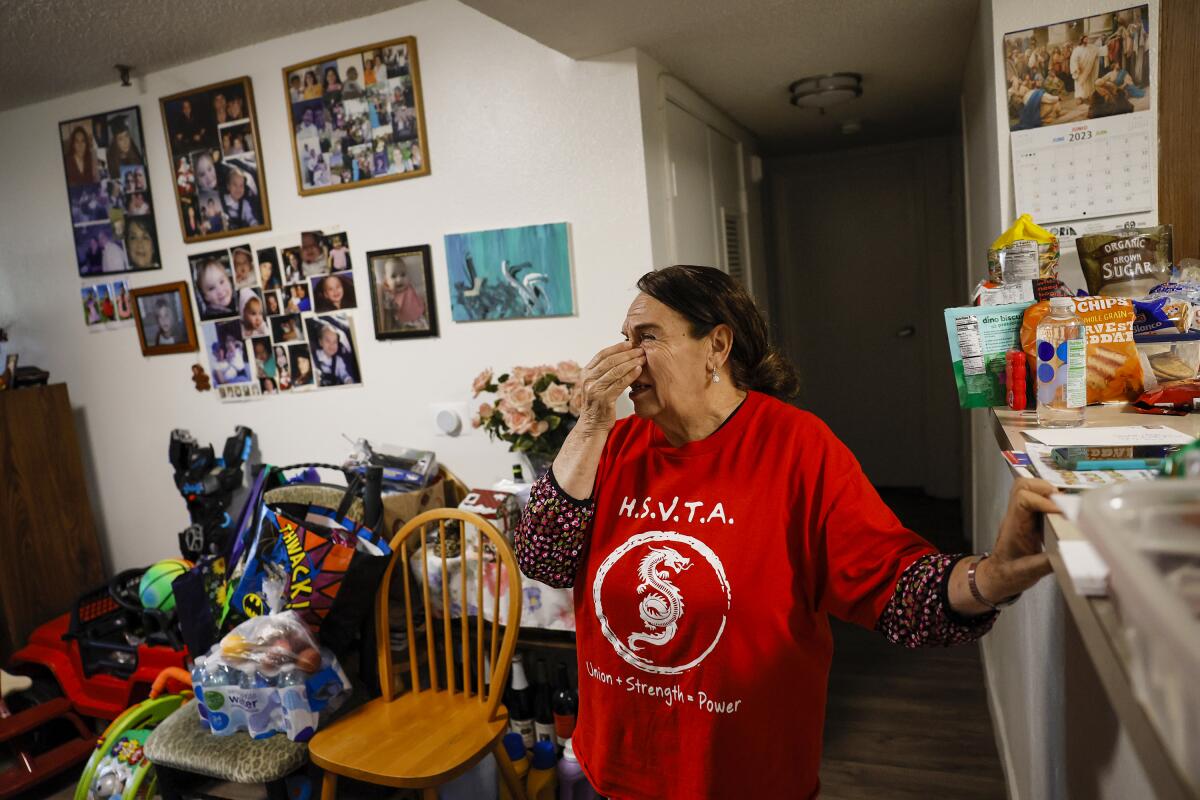
Public use in this case, proponents argue, means preventing evictions and creating affordable housing in a neighborhood and region that badly needs it.
The complex’s owner, Tom Botz, has refused multiple times to sell the property and declined to extend the affordability covenants that have kept rents within reach of families such as Hernandez’s. Botz hiked rents, in some cases by 100%, when the covenant expired in 2018, and 18 families have received unlawful detainer notices, a legal precursor to eviction, according to Jacob Woocher, an organizer with the L. A. Tenants Union representing some of the residents facing eviction.
Botz’s attorney Michael Leifer did not respond to a request for comment Tuesday, but he called the plan “beyond wasteful” in a letter to the city.
Hillside Villa residents voiced frustration over rent hikes sought by the building’s owner. The council voted Friday to proceed with the purchase.
Eminent domain is an unpopular policy that has typically been deployed to build stadiums and freeways, most famously at Chavez Ravine to make way for Dodger Stadium. Developers claim it is anti-business, and even staunch proponents of affordable housing agree eminent domain is too easily tied up in court to serve as a reliable method of producing the necessary units. And some people view it as an attack on a quintessential American right, that of property ownership.
But it’s important that the city consider every available tool, because at least 500 affordability covenants, covering thousands of affordable residential units across the city, are set to expire within the next decade. Advocates warn of a wave of evictions that would drastically affect affordability in Los Angeles.
“Hillside Villa is the canary in the coal mine,” said Councilmember Eunisses Hernandez. “Thousands of units are on the brink of eviction, and we need to plan for that.”
Can an affordable housing complex be considered a public good? It depends on what you think a public good should be, and that often depends on your politics.
But I know that at Hillside Villa, a lot of people would argue Rosario is a public good. She has provided child care for single working mothers and is part of a network of working parents who help watch one another’s children. She is raising her 3-year-old grandson, whose toys cover about half of the living room. Their apartment has enough space for him to use an entire wall to display his art. Is that a public good?
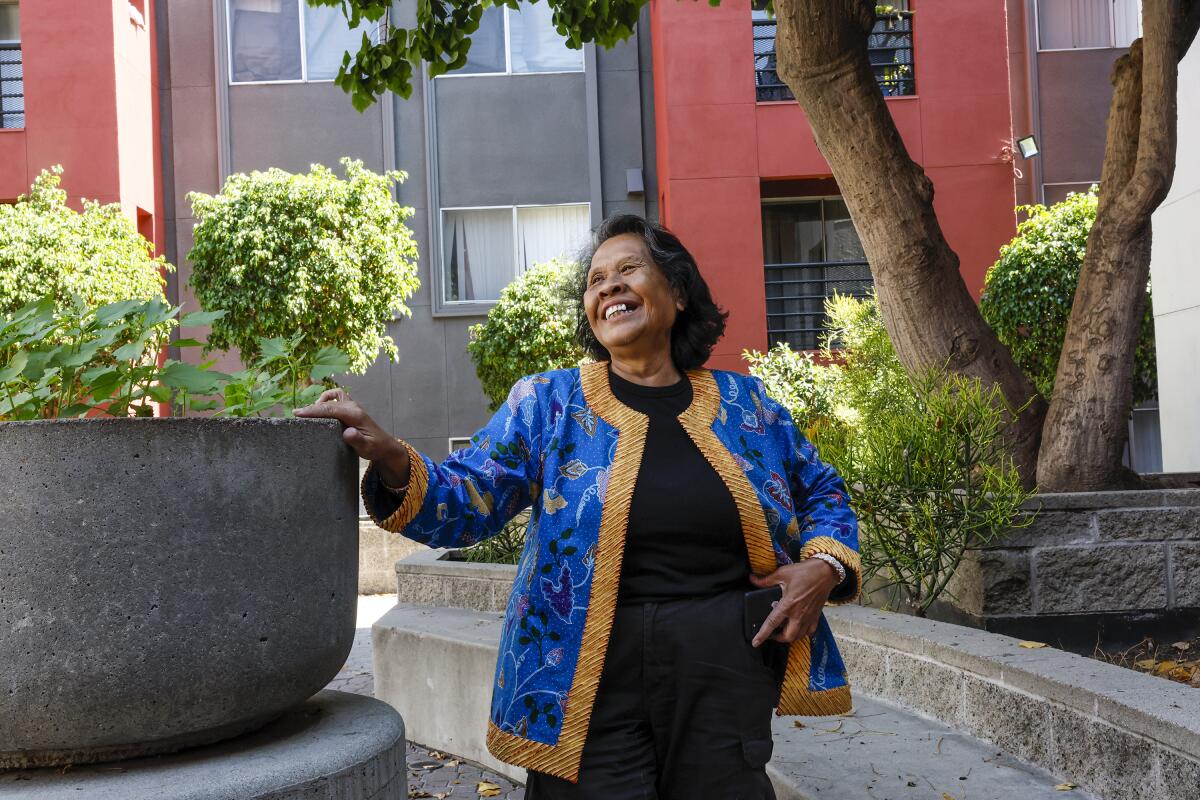
Castelar Elementary School is just two blocks away, close enough for kids to walk safely if their parents have to work. Hillside Villa’s residents encompass generations of students and parents who have productive relationships with the teachers and classrooms there. And elderly residents can access affordable healthcare in their own language in Chinatown. Can these relationships be considered a public good?
Research shows eviction is linked with higher rates of depression, suicide and homelessness. Eviction tarnishes a tenant’s record and makes it harder to find a new apartment. It creates additional financial burdens and forces people to search for housing in often unsafe neighborhoods. For children in insecure housing situations, grades suffer and mental health declines. Is preventing that a public good?
Housing policy is often justified with a calculus that treats every resident as interchangeable — a tech worker from Austin represents the same amount of regional housing demand as your grandma or auntie who holds down the whole family.
But what residents at Hillside Villa tell me is that they are not all alike. That without people like them, their community, the neighborhood, and this city, won’t be the same.
It’s hard to measure what’s lost when a community is broken up, just as it is hard to quantify exactly how much stress eviction adds to your life, or how much it affects a single parent’s life when they lose their child care. But this web of connections plays an outsized role in creating the kinds of communities that reject crime, prevent homelessness and support healthy families.
L.A. leaders cannot ignore the serious repercussions of regularly seizing private property for affordable housing.
For the record:
3:14 p.m. Oct. 10, 2023An earlier version of this story described Glenn Wasserman as chief executive of the city’s redevelopment agency. He was chief operating officer.
Eminent domain may not be the best way of producing affordable housing, but it’s a start, said Glenn Wasserman, a former attorney for the city’s redevelopment agency who also served as its chief operating officer between 2006 and 2010.
If the city and current property owner can’t come to an agreement over affordable housing, eminent domain can be “a creative way to extend the term of affordability covenants after they expire,” Wasserman said.
The city has proposed using money from the reserve fund to buy the property, and the estimated price tag for purchase and rehabilitation is nearly $60 million.
The reserve fund is not designed to be used this way, and nor is eminent domain. But we also didn’t intend to create a city in which affordability itself is in real jeopardy, where many Angelenos spend more than half of their income on rent — median annual rent in Los Angeles is about $35,220 a year — and median income is $69,778, according to the latest census.
The current cash balance of the reserve fund is $811 million. City policy states it must maintain a balance worth at least 5% of the general fund’s budget for the year, which is $375 million.
With the remaining $436 million, the city could at most, repeat this experiment six more times, which amounts to 868 units of permanently affordable housing.
This works out to about $500,000 per unit of permanently affordable housing, not exactly an efficient solution. But I think the residents of Hillside Villa correctly believe the city can afford to purchase their building. The city could buy several like it without jeopardizing anything but the safety margin of the reserve fund.
It’s time that Los Angeles use its most powerful tools to help its most needy residents. There is widespread demand for housing policy that recognizes the value of keeping people in their homes, that does not treat every resident as interchangeable.
Rosario knew it wasn’t fair that she had to leave her home so the convention center could expand. She hails from a small village in Zacatecas, Mexico, where “if you own a property, it’s yours and that’s it.” But the eminent domain process included relocation assistance, and she fell in love with her current apartment, where she’s lived for the last 36 years.
It was new, comfortable and clean when she moved in — not spacious, but enough room to raise a family. Large, homemade collages of her grandchildren’s and children’s photos cover most of the walls in their house.
Rosario is practical — she is hopeful the city will come to her aid, but she’s also been scouting the rental market. The anxiety of a looming eviction never leaves. Sometimes she catches herself packing up their possessions, trying to prepare for the worst.
She and her husband might find a nearby apartment within her price range, but what if they cannot afford space for her daughter and grandson? She can’t think of being separated from them without tears.
“My grandson, he’s always saying, this is my home, my house,” Rosario said. Because she always looks stressed these days, “he’s always asking me, grandma, are you OK?”
Eviction or eminent domain — in truth the details matter little to her. Again she faces eviction because wealthy people have decided there is a more profitable use for the space in which she has made her home.
But this time there is no relocation program, no affordable housing waiting — only uncertainty.
More to Read
Sign up for Essential California
The most important California stories and recommendations in your inbox every morning.
You may occasionally receive promotional content from the Los Angeles Times.

